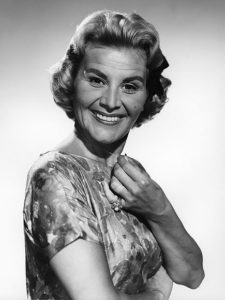We Say Goodbye to Those We Lost in 2018
Posted on December 31, 2018 at 8:00 am
A beautiful tribute from CBS Sunday Morning to those who left us in 2018, gently showing us what links them to each other and to each of us.
Posted on December 31, 2018 at 8:00 am
A beautiful tribute from CBS Sunday Morning to those who left us in 2018, gently showing us what links them to each other and to each of us.
Posted on December 30, 2018 at 8:00 am
TCM’s beautiful tribute to the actors, producers, screenwriters, directors, and other filmmakers who died in 2018.
Posted on December 29, 2017 at 12:29 pm

After all, she had been a singing superstar as a little girl with a very big voice and and a bigger personality, billed as “the child wonder.”
Here she gives her thoughts on comedy.
And how the Sally Rogers character was based on her own personality.
I was proud to contribute to the Kickstarter campaign for the documentary about Rose Marie that came out earlier this year. It includes many remarkable stories about her early days as a child superstar and her appearances in Las Vegas back when the mob was running the casinos.
Carl Reiner, creator of “The Dick Van Dyke Show,” wrote on Twitter:
I was so sad to learn of the passing of Rosemarie. There’s never been a more engaging & multi-talented performer. In a span of 90 years, since she was four, dear Rosie performed on radio, in vaudeville, nightclubs, films, TV, & Vegas & always had audiences clamoring for “more!!”
Bill Persky, a writer for the show, paid tribute on Twitter as well: “Laughter lost a friend today with the passing of Rosemarie, Every line we wrote for her was guaranteed, she never failed to deliver, The New Year will be less happy with her gone.”
Columnist Amy “Ask Amy” Dickinson wrote in her book that her appearances on the NPR show “Wait Wait Don’t Tell Me” are inspired by her inner Sally Rogers. I think all of us of that generation, especially those who write, have a bit of Sally — and Rose Marie — in us.
May her memory be a blessing.
Posted on August 20, 2017 at 7:36 pm
We mourn the loss of one of the great figures of 20th century entertainment, Jerry Lewis, a performer who was at the top in nightclubs, movies, radio, and television. He was a successful and innovative director of film as well.
He was an extraordinarily gifted physical comedian.
He liked to describe his act with Dean Martin as “the handsome man and the monkey.”
After Martin left him, Lewis was devastated. In one of his most successful solo films, “The Nutty Professor,” a sort of reverse Jeckyll and Hyde story, he essentially played both roles.
Lewis became a director who learned every technical aspect of filmmaking, down to loading the camera. He invented the instant video feedback system that is now standard.
He was also a superb dramatic actor, most notably in Martin Scorsese’s “King of Comedy,” playing a kidnapped talk show host, opposite Robert de Niro.
He was also a tireless, if sometimes controversial, fundraiser for muscular dystrophy with annual Labor Day telethons.
Shawn Levy’s insightful book, King of Comedy: The Life and Art Of Jerry Lewis, has the best description I’ve seen of the complicated relationship between Lewis and his audience. His talent could be overwhelmed by his voracious need for attention and his barely hidden hostility. He had a rare combination of ferocious commitment to entertaining, putting everything he had into it, but holding a great deal back, never showing us who he really was, as any truly great entertainer should do.
But at his best, with Martin and working with director Frank Tashlin, he was as good as it gets.
May his memory be a blessing.
Posted on August 9, 2017 at 12:40 am
We bid a sad farewell to Glen Campbell, who has died at age 81 from complications of Alzheimer’s Disease. The Rhinestone Cowboy was at the top of the country and pop charts and had some success as an actor as well, appearing with John Wayne in “True Grit.” He hosted a popular television variety series as well.
Here he sings one of his hits, “Southern Nights,” with Jerry Reed.
At the height of his career, Mr. Campbell was one of the biggest names in show business, his appeal based not just on his music but also on his easygoing manner and his apple-cheeked, all-American good looks. From 1969 to 1972 he had his own weekly television show, “The Glen Campbell Goodtime Hour.” He sold an estimated 45 million records and had numerous hits on both the pop and country charts. He was inducted into the Country Music Hall of Fame in 2005.
Decades after Mr. Campbell recorded his biggest hits — including “Wichita Lineman,” “By the Time I Get to Phoenix” and “Galveston” (all written by Jimmy Webb, his frequent collaborator for nearly 40 years) and “Southern Nights” (1977), written by Allen Toussaint, which went to No. 1 on pop as well as country charts — a resurgence of interest in older country stars brought him back onto radio stations.
Like Bobbie Gentry, with whom he recorded two Top 40 duets, and his friend Roger Miller, Mr. Campbell was a hybrid stylist, a crossover artist at home in both country and pop music.
His final tour, as he struggled with memory loss, was documented in the touching film “I’ll Be Me.”
May his memory be a blessing.